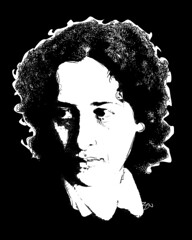Mini Biography of Hannah Arendt
Wisdom of Life: To creatively solve problems requires that you expand your general knowledge. The Wisdom of Life Profiles are meant to do just that. There are many people who you will hear about for the first time on this blog. Hannah Arendt was included in one of the books I have about the greatest thinkers, so I decided to learn more about her. Some of the people who I research for these profiles touch me deeply, Arendt wasn’t one of them. However, I recognize that we are all different and her story may resonate with you. As usual, I have included the sources I read in case you want to learn more.
A political theorist, Hannah Arendt’s most important and influential work was The Origins of Totalitarianism. In this seminal work, the first of its kind, Arendt emphasized the parallels between Adolf Hitler’s Third Reich, and Joseph Stalin’s Soviet Union. In 1975, Arendt became the first woman, and the first U.S. citizen, to be awarded Denmark’s Sonning Prize for contributions to European civilization.

Name: Hannah Arendt
Birth Date: October 1906 – December 1975
Job Functions: Philosopher, Writer and Political Theorist
Fields: Philosophy
Known For: The Origins of Totalitarianism
Hannah Arendt was born to middle class Jewish Parents in Hannover, Germany in the early twentieth century. Her father died in 1913, when she was seven, and her mother encouraged her to pursue her education. Arendt began her university education in 1924 in Marburg.
There she studied with Rudolf Bultmann in New Testament, and Martin Heidegger in philosophy. Arendt also studied with the phenomenologist Edmund Husserl at Freiburg, and with the existentialist Karl Jaspers at Heidelberg where she received her doctorate in 1929. She remained close friends with Heidegger and Jaspers throughout her life, and they greatly influenced her philosophical work.
After Arendt completed her Ph.D. in 1929, she married writer Gunther Stern, and began writing Rachel Varnhagen: The Life of a Jewess, a biography of an 18th century Berlin hostess. Her writing was interrupted in 1933, when she was arrested and briefly imprisoned by the Gestapo for gathering evidence of Nazi anti-Semitism. When she was released a week after her arrest, Arendt and Stern escaped to Paris, working in various Jewish organizations, one of which was Youth Aliya where she helped to relocate Jewish children to Palestine.
Her marriage to Stern ended in 1936, after she met former communist, and historian Heinrich Blücher. Arendt married Heinrich Blücher in 1940. Soon after her marriage, Germany occupied France and Arendt and Blücher fled to New York in Spring 1941.
During World War II, Arendt wrote a political column for the Jewish weekly Aufbau. Other European expatriates, including philosopher Paul Tillich, helped Arendt place her articles in leading Jewish journals such as Jewish Social Studies, Jewish Frontier, and Review of Politics. As Arendt and her husband learned English, their circle of friends expanded to include American intellectuals such as Alfred Kazin, Mary McCarthy, and Philip Rahv. This allowed her writing to find a wider audience.
In the late 1940s, Arendt worked as a director of research at the Conference on Jewish Relations, taught history part-time at Brooklyn College, and was senior editor at Schocken Books. During those years, she published articles on political philosophy in Partisan Review, Review of Politics, and The Nation. Arendt also worked on locating Jewish survivors of the Holocaust, retrieving Jewish property taken by the Nazis and served on a campaign supporting the establishment of a bi-national Arab-Jewish state in Palestine.
Arendt took her essays, developed and published them in her first major book, The Origins of Totalitarianism

In 1961, while Arendt worked as a reporter for The New Yorker magazine, she traveled to Jerusalem to cover the trial of Nazi Adolf Eichmann, who oversaw the execution of many Jews during the Holocaust. She published her account of the trial in book form as Eichmann in Jerusalem: A Report on the Banality of Evil (1964). Arendt argued in her book, that Eichmann was more bureaucratic and thoughtless than radically evil, and not unlike the rest of humankind. Her book however endorsed the Israeli verdict that Eichmann be hanged. Her public reputation suffered, and Arendt lost friends and never recovered from the controversy that Eichmann in Jerusalem stirred up.
While at the University of Chicago, 1963 to 1967, and the New School for Social Research in New York, 1967 to 1975, Arendt delivered outstanding lectures to the students. During late 1960s, Arendt wrote essays on current political issues (the Pentagon Papers, violence, civil disobedience), published as Crises of the Republic


In 1973 and 1974 she delivered the prestigious Gifford Lectures in Scotland, which were subsequently published as The Life of the Mind
Hannah Arendt’s Steps to Success
- Worked very hard and constantly practiced her craft.
- Rose above the challenges in her life.
Works Cited/Referenced
Encyclopedia of World Biography
UXL Encyclopedia of World Biography
American Decades
Encyclopedia of Philosophy
Encyclopedia of Science, Technology and Ethics
American Women Writers
Encyclopedia of Genocide and Crimes Against Humanity
Europe Since 1914
International Encyclopedia of the Social Sciences
Scribner Encyclopedia of American Lives, Thematic Series
Book link is affiliate link.
Related articles
- ‘The Eichmann Trial’ New Book By Deborah Lipstadt Provides insights Into Famous Trial (huffingtonpost.com)
The Origins of Totalitarianism The Human Condition, 2nd Edition
The Human Condition, 2nd Edition The Life of the Mind (Combined 2 Volumes in 1) (Vols 1&2)
The Life of the Mind (Combined 2 Volumes in 1) (Vols 1&2) On Revolution (Penguin Classics)
On Revolution (Penguin Classics) The Portable Hannah Arendt (Penguin Classics)
The Portable Hannah Arendt (Penguin Classics) Responsibility and Judgment
Responsibility and Judgment Hannah Arendt: A Life in Dark Times (Icons)
Hannah Arendt: A Life in Dark Times (Icons) On Violence (Harvest Book)
On Violence (Harvest Book) Hannah Arendt
Hannah Arendt
The post Hannah Arendt, Philosopher, Writer and Refugee from Adolph Hitler appeared first on The Invisible Mentor.









